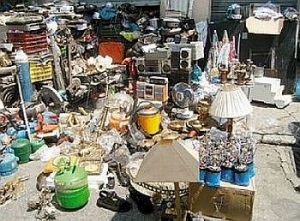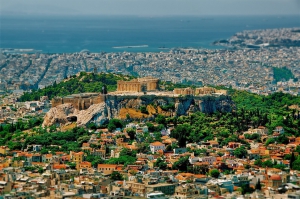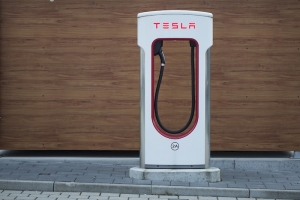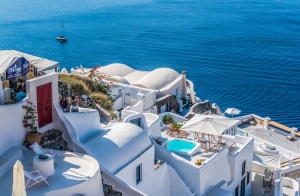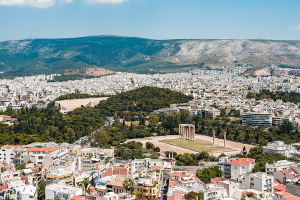XpatAthens
The True Piraeus Flea Market
The Piraeus flea market, held every Sunday morning by the metro station, is the gritty alternative to Monastiraki’s famous swap meet. The market, which stretches back parallel with the train line for as far as the eye can see, is bursting with stalls and people from 8am till 2pm.
The stalls are a curious assortment: some are large and well-ordered with plastic coverings to shield purchasers from the hot sun, while others are just piles in the street, distinguishable from rubbish only by the attached price tags. There are even wandering stallholders with trays full of glue tubes or large wooden poles covered with lottery tickets. This offers an immediate difference to its Monastiraki counterpart, where vendors often plug typical tourist fare that is continuously on sale in Plaka, sometimes straight from their shops.
As you cruise the narrow space between stalls, everyone seems to be yelling, from the stallholders perched on top of their tables shouting “Ella! Ella!” [Come! Come!] to the customers demanding a discount, and shouts are often interspersed with hands being slammed on tables. You’re not likely to see tourists being teased to buy evil eye pendants in Piraeus; rather, here you are jostled and ignored unless you have your hand firmly on the prize and wave your money in the vendor’s face. Every man for himself.
If you head for the market with ideas about priceless antiques or secondhand treasures, then you are likely to be disappointed. The vast majority of traders sell new products, many of which are the knock-off designer bags and sunglasses that litter every roadside in central Athens. However, many more offer a large variety of clothes and shoes at bargain prices: a fact easily surmised by the crowds of shoppers trawling through piles of Snoopy pants and elbowing each other out of the way.
Further down the row is a general household area, with frying pans dangling from strings, spoons glinting in the sunshine and large women sitting plonked in the middle of their colourful bedspreads. This is certainly a functional market, with families out buying their weekly supplies rather than tourists browsing overpriced jewellery stands.
Among the colourful T-shirts and sandals is the occasional glimmer of the romantic flea market, like a small old man slumped behind a rickety table laden with old coins and stamps. Even more enchanting are the surprises lurking down sidestreets, where some sellers appear to have emptied the contents of their house or taken their car apart and piled it all up in the road.
If you brave it through to the end, there is a minivan in which a woman sells soft drinks and snacks, with pictures for non-Greek speakers. There is also a man with a transportable grill who tends his lamb kebabs with a miniature hairdryer, as well as a few fruit stalls selling bruised and battered pineapples. Gritty? Perhaps. But also a much more enticing and curious experience than squeaky-clean Monastiraki and even some bargains if you’re willing to tackle the crowds.
As originally seen on: www.homeboy.gr
Greece Today: Safe, Affordable And More Beautiful Than Ever
Black Friday 2016
*Note, to find the best deals and to see what stores are participating in Greece, we recommend searching 'Black Friday Sales + Your Location' on Google or Facebook.
Tesla Hub Established In Athens, Greece
Greece Voted 'Best Sunny Escape' According To Expat Survey
Athens Amongst The Top 6 For European Capital Of Innovation Award
Applications will be judged by independent experts from across Europe. A monetary prize of 1 million euro will be awarded to the winning city while 100 thousand euro will be awarded to each of the five runner-up cities.
Article Source: European Commission & Thema News
4 Vineyards To Explore In Athens

@mylonas_winery
The Mylonas Winery was founded in 1917 in Keratea, Eastern Attica by the grandfather of the current proprietors. Due to their long wine-producing heritage, they deliver great wines such as the awarded Savatiano, Malagousia, and Retsina wines. The winery is open to the public by appointment.
Telephone: 22990 68156

@papagiannakos_winery
The Papagiannakos Winery is the first winery in Greece purposely built according to innovative bioclimatic standards. The winery is built on the site of an old monastery in the heart of the Mesogian plains. The winery is open on weekdays, and Saturdays from 9 am to 4 pm.
Telephone: 22990 25206
3. Nikolou Winery

@nikolouwinery
Located in the heart of Koropi, Nikolou Winery has been producing wines since 1875. It is the only winery in Attica that specializes in the production of sparkling wines using the traditional method. Guests can visit the production locations and have a unique experience, which includes sampling wines through various packages. There are additional training events for students with an interest in oenology.
Address: Nik. Ntouni 8, Koropi, Attica
Telephone:210 6020775
4. Kokotos Estate

@kokotosestate
Telephone: 210 8145113
A Year Of Cultural Events Dedicated To Melina Mercouri
To read this article in full, please visit: GTP
Parenting: The Importance Of Keeping Your Word
How about the times you’ve been angry with your child and you’ve said something like "I will never give you my cell phone again," or "We will never go on a playdate with your friend again," or "Computer games are off," or even "I will never take you anywhere with me." Remember, did you do what you’ve said you were going to do? Did you stop going to their friend's house to play? Did you not give them your cell phone?
As parents it is very important to mean and do what we say we’re going to do; to not make promises that we do not keep. This does not mean we should always have the same behavior as we are human beings and our emotions as well as our moods change. I'm not talking about that kind of consistency. I am referring to how you can put into practice what you say as well as to the content of what you say.
In raising children, it is of outmost importance to keep your word. But first you need to be careful with what you say. Will you really walk the talk? Will you really take your child and leave their friend’s house while you are having a good time with their friend's mom? If the answer is yes, I’m all for it. You will give a much needed and at the same time excellent lesson to your child. But if you said something just because you were angry, remember that at that moment you're giving your child a confusing double message.
![]()
If there’s a topic you’re interested in and would like to learn more about you may contact me via email. For more information about me and my work check the XpatAthens Directory or visit my website. Because this is your life!
EU Commission Consults Citizens & Stakeholders On Possible New Soil Health Law
Soils are the foundation of our food security, providing 95% of the food we eat. Healthy soils are vital for life on Earth. They deliver many essential services and are crucial to achieving key objectives of the European Green Deal such as climate neutrality, biodiversity restoration, zero pollution, healthy and sustainable food systems, and a resilient environment.
The EU Soil Strategy for 2030, adopted on 17 November 2021, sets the vision to have all soils in healthy condition by 2050 and to make the protection, sustainable use, and restoration of soils the norm. It also announces that the Commission will table a new legislative proposal on soil health providing a comprehensive legal framework for soil protection granting it the same level of protection that exists for water, the marine environment, and air in the EU. This proposal will complement the Nature Restoration Law and, ensure synergies with climate change mitigation and adaptation actions.
Sustainable soil management and restoration require the involvement of a wide range of economic and societal actors. Therefore, from farmers to foresters, from land planners to industry, from national governments to local authorities, from NGOs to citizens, all stakeholders are invited to share their views on this initiative on soil health via an online consultation that runs until 24 October 2022.
Soils host more than 25% of the world’s biodiversity, are the largest terrestrial carbon pool on the planet, and play a key role in the circular economy and adaptation to climate change. Yet, some 60-70% of EU soil ecosystems are unhealthy and suffering from degradation. Soil degradation is thought to cost the EU around 50 billion euros per year. Halting and reversing current trends of soil degradation could generate up to EUR 1.2 trillion per year in economic benefits globally.
To read this article in full, please visit the European Commission's official website.


